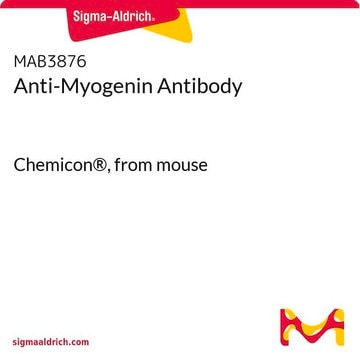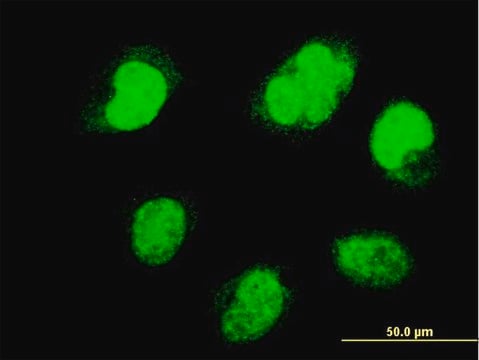M5815
Monoclonal Anti-Myogenin antibody produced in mouse
clone F12B, purified immunoglobulin, buffered aqueous solution
About This Item
Produits recommandés
Source biologique
mouse
Niveau de qualité
Conjugué
unconjugated
Forme d'anticorps
purified immunoglobulin
Type de produit anticorps
primary antibodies
Clone
F12B, monoclonal
Forme
buffered aqueous solution
Poids mol.
antigen 34 kDa
Espèces réactives
mouse, rat, human
Technique(s)
immunohistochemistry (formalin-fixed, paraffin-embedded sections): 1-2 μg/mL using rhabdomyosarcoma tissue sections
immunoprecipitation (IP): 2 μg using 1 mg protein lysate
indirect ELISA: suitable
indirect immunofluorescence: suitable
western blot: 1 μg/mL
Isotype
IgG1
Numéro d'accès UniProt
Conditions d'expédition
wet ice
Température de stockage
−20°C
Modification post-traductionnelle de la cible
unmodified
Informations sur le gène
human ... MYOG(4656)
mouse ... Myog(17928)
rat ... Myog(29148)
Description générale
Immunogène
Application
Actions biochimiques/physiologiques
Forme physique
Clause de non-responsabilité
Vous ne trouvez pas le bon produit ?
Essayez notre Outil de sélection de produits.
En option
Code de la classe de stockage
10 - Combustible liquids
Classe de danger pour l'eau (WGK)
nwg
Point d'éclair (°F)
Not applicable
Point d'éclair (°C)
Not applicable
Certificats d'analyse (COA)
Recherchez un Certificats d'analyse (COA) en saisissant le numéro de lot du produit. Les numéros de lot figurent sur l'étiquette du produit après les mots "Lot" ou "Batch".
Déjà en possession de ce produit ?
Retrouvez la documentation relative aux produits que vous avez récemment achetés dans la Bibliothèque de documents.
Les clients ont également consulté
Notre équipe de scientifiques dispose d'une expérience dans tous les secteurs de la recherche, notamment en sciences de la vie, science des matériaux, synthèse chimique, chromatographie, analyse et dans de nombreux autres domaines..
Contacter notre Service technique










